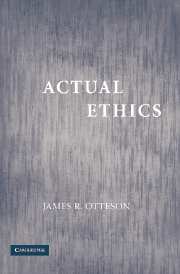Book contents
8 - More Moral Hobgoblins: Extending Rights
Published online by Cambridge University Press: 17 November 2009
Summary
RELIGION AND RIGHTS
Two things you may have noticed about the discussions so far in this book are that nothing in the arguments has turned or depended on any sort of religious beliefs and that there has been vanishingly little about any notion of natural rights. The reason for the first is not that I discount or disparage religious belief; on the contrary. You may recall from the Preface, however, that one of the four central theses often taught in contemporary “ethics” classes is that there exists no consensus about what a moral life is or what constitutes virtue, and you may also recall that I claimed that this was false. As I have suggested earlier, I believe that there is indeed substantial and widespread agreement about the main contours of a moral life. To be specific, almost everyone believes that ‘justice’ should be respected. That is, almost everyone subscribes to the view that we should respect one another's person, liberty, and property, at least in our personal associations and dealings with others. Moreover, there is also general agreement about the central elements of ‘virtue,’ including honesty, courage, and temperance. My contention is that this agreement cuts across political and religious differences. That is why I did not draw on the authority of any particular religious tradition: I did not want to give the misleading impression that only a subscriber to this or that religious view could be persuaded by my arguments or recognize the eligibility of justice, honesty, courage, and temperance.
- Type
- Chapter
- Information
- Actual Ethics , pp. 278 - 316Publisher: Cambridge University PressPrint publication year: 2006



